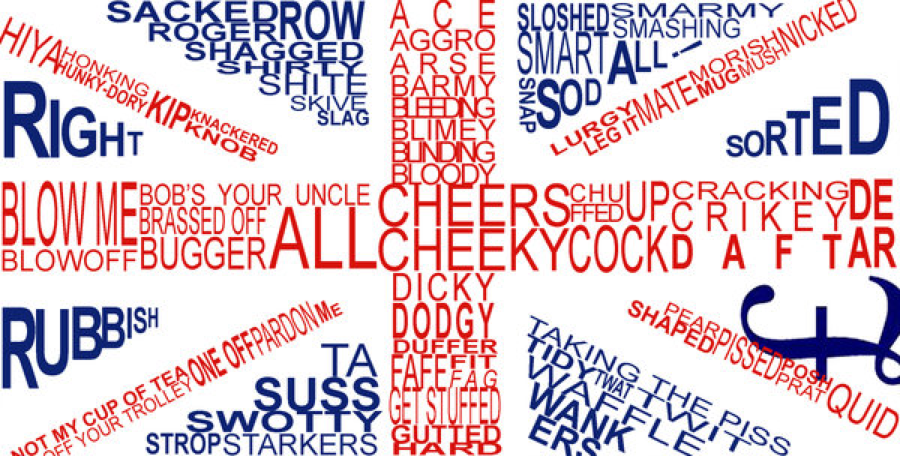English Settings II: British Slang
British Slang is a sequel to English Settings I: Britishisms.
I’ll start where I started before: So you’re an American novelist and you’ve chosen to set your story in England. That’s great. But now here’s your problem: English.
In my earlier blog I said that British slang was a category unto itself and completely delightful. So it’s getting its own treatment here. I’ve been reading gobs of British police procedurals and decided to make a list of all the usages that struck me as interesting or, at least, different than American English usages.
I was amazed to discover the extent of the differences, which are usually subtle, always understandable in context, and yet finally noticeable when I started paying attention. The following is a fraction of my entire list. Not all the examples count as British slang, as such.
A
arsed – as in can’t be arsed ‘bothered’
B
barney – ‘row’ ‘quarrel’
to be a patch – as in he’s not a patch on you ‘he can’t compare to you’
bloody cheek! – ‘the nerve!’
bugger all – ‘nothing’
C
chippy (adjective)– ‘easily offended or annoyed’
chippy (noun) – a fish and chips place
to clock – ‘to observe’
cock-up – ‘error’
to come a cropper – ‘to have a run in with’
to come across – as in until he comes across ‘to fess up’
to crack on – ‘to continue’
D
to doss down – ‘to crash’ (on someone’s couch, say)
dosh – ‘money’
E
end of – as in I knew a bloke who needed a job, and I could get him one. So I did. End of. ‘end of story’
F
to faff about – ‘to fiddle around’
fag – ‘cigarette’
to fit someone up – ‘to frame someone’ (say, for murder)
G
to gawp around – ‘to look at’
to gazump – ‘to steal’
to get sprogged up – ‘to have children’
to go down the pan – ‘to go down the drain’
to grass (up) someone – ‘to tell on’ ‘rat on’
H
to hoon around – ‘to drive recklessly
to hoover – ‘to vacuum’
I
incandescent – ‘beyond irate’ ‘livid’
it still needs work doing – ‘it still need some work’
J
to jack in – as in to jack in a job ‘get rid of’
K
to kip – as in you’ve been kipping on her sofa ‘sleeping’
knackered/knackering – ‘tired’/‘tiring’
to knock someone for six – ‘to upset’ ‘to overwhelm’ ‘to stun’ (a cricket reference)
L
lash – as in to go out on a lash ‘binge drink’
lot – as in you lot ‘you guys’ (though not outright rude, it’s never used positively)
M
mockers – as in to put the mockers on our murder investigation ‘kaibosh’
monged – as in monged out on weed ‘oversated and immobile’
N
naff – ‘uncool’ ‘tacky’ ‘worthless’
nick – ‘police station’
O
on – as in that’s not on ‘that’s no cool’
as in she’s on the game ‘she’s a prostitute’
as in to have a lot on ‘to be busy’
on about – as in in case people didn’t know what he was on about ‘talking about’
P
patch – ‘beat’ (police)
peeler – ‘policeman’
pillock – ‘fool’ ‘stupid person’
to piss off – ‘to go away’
plonk – ‘alcohol’
to plump for – ‘to get behind’ ‘to vote for’
poncey – ‘snotty’ ‘fancy’ ‘pretentious’
prat – as in to look a prat ‘look foolish’
R
to ring off – ‘hang up’ (telephone)
to rub out – ‘to erase’ (in the pencil sense, not the mafia sense)
to rumble – ‘to catch on to someone’
S
to scarper – ‘to get lost’
shirty – ‘annoyed’
sod all – ‘nothing’
to spark out – ‘to fall asleep abruptly’
to stand – as in I’ll stand you coffee and cake, if that helps ‘pay for’
strapline – ‘tag line’
stroppy – ‘grumpy’ ‘arsed’
T
to take the piss – as in Now you’re just taking the piss ‘taking advantage (of me)’
to talk tosh – ‘to talk crap’
tick – as in I’ll be back in a tick ‘short time’
to top – ‘to kill’
toss – as in I don’t give a toss for normal practice ‘care’
U
up – as in a bit up herself ‘snooty’
to up sticks – ‘to gather your gear’ (and move out)
V
verge – ‘shoulder’ (of a road)
W
to waffle on – ‘to yammer on’
wankers – a mild (?) curse
wazzock – ‘idiot’
wheelie bin – ‘big plastic garbage can’
to winkle out – ‘to figure out’
to witter on – ‘to yammer on’
to whinge – ‘to complain’
wonder – as in for a wonder ‘as a surprise’
wooly – ‘vague’
Y
to yomp – ‘to march over heavy terrain’
yonks – as in yonks ago and for yonks ‘a long time’
British slang is endlessly fascinating.
Read English Settings III: Americanism/Anachronisms next!
Categorised in: Adventure, Europe, Language, London, Writing
This post was written by Julie Tetel Andresen
You may also like these stories:
- google+
- comment




